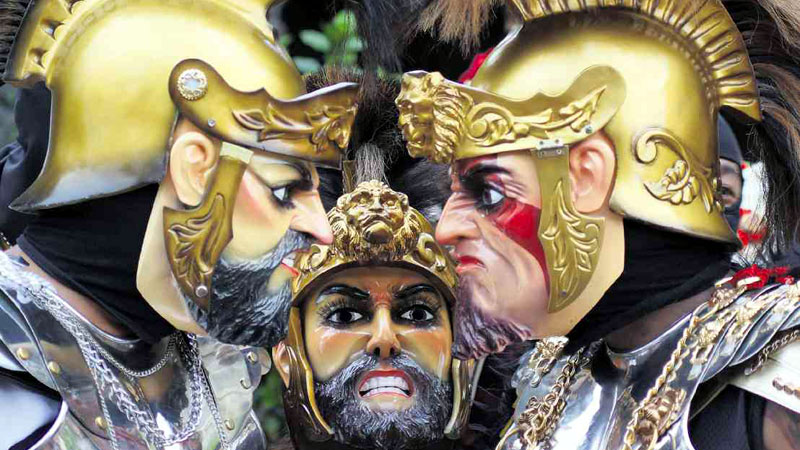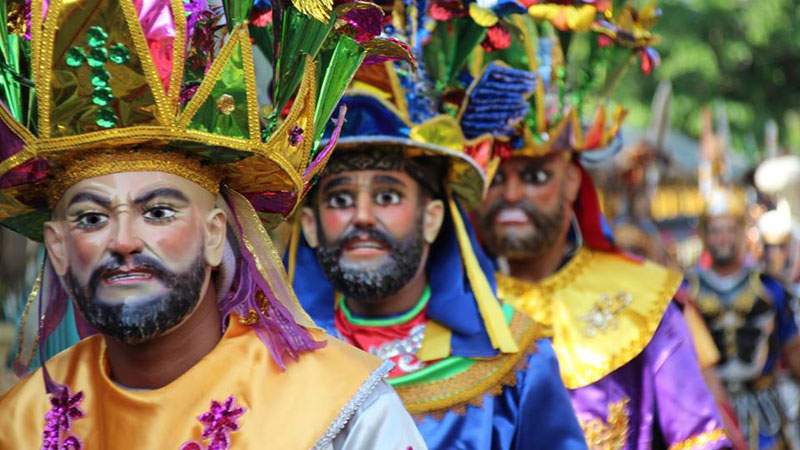Morion is face of deep religiosity of Marinduqueños

FACE-OFF Men in Moriones masks reenact the chase and arrest of the Roman soldier Longinus through the streets of Marinduque in what has become the annual Moriones (masks) festival during Holy Week. According to legend, Longinus converted to Christianity when blood from the side of the crucified Christ splashed on his blind eye and restored his sight. INQUIRER PHOTO
MOGPOG, Marinduque—The Mazons of Barangay Capayang here woke up early on Holy Monday to fulfill a Lenten vow.
As the sun rose, couple Jun and Ella Mazon led 11 other family members—their children, year-old grandchild, nephews, nieces and other relatives—in wearing Morion (Roman centurion) masks and costumes to join other penitents on the streets.
It was in Mogpog, a third-class municipality (annual income: P35 million-P45 million), where Marinduque province’s Moriones Festival originated in the 1800s. The town was then a barrio of the capital Boac.
Residents dress up as a Morion for this celebration as a gesture of thanksgiving for answered prayers or for overcoming crises in life, such as sickness or accidents in the family, or as a panata (vow) to atone for sins.
The Mazon family has sustained this panata through generations.
Article continues after this advertisementJun, 30, said he started wearing the mask and costume when he was 7 years old, tagging along with his parents who also played Moriones in the street spectacle.
Article continues after this advertisementThe vow, with prayers for good health and a comfortable life, has been continued by his family.
Promoting Gospel
According to Rev. Fr. Ulysses Santos Rivamonte, parochial vicar of the St. Isidore Labrador parish here, the Moriones has become one of the Roman Catholic Church’s ways to promote both the gospel and the culture of Marinduque, an island-province 267 kilometers south of Metro Manila.
“The Moriones celebration shows the Marinduqueño’s religiosity. This [event] is said to be historical in origin but religious in meaning,” Rivamonte said.
Historical accounts showed that the religious drama was introduced by an Augustinian Recollect priest, Dionisio Santiago, who was overseeing the St. Isidore Labrador parish that time, to proclaim the value of the Holy Week celebration and understanding faith through Christ’s Passion.
When Santiago came to Marinduque, he devised a way to entice people from remote villages to gather in the parish, especially on Holy Week.
“I think, if I am not mistaken, it was during Good Friday, from 12 noon to 3 p.m., when Santiago thought of staging a reenactment of the Passion of Christ. So basically, the scene of the first reenactment was the [Calvary] scene, with Jesus on the cross,” said Bishop Marcelino Antonio Maralit Jr. of the Diocese of Boac.
Maralit said the first reenactment involved a person imitating a Roman soldier wearing a centurion helmet, called “morion.” The headgear later evolved to
include a mask depicting the faces of Roman soldiers.
The modern Moriones celebration features the wooden Morion mask and headgear. Most masks feature sharp eyes and a beard and display a villainous scowl. Others depict a woman or a child, with their features seemingly angelic.
Story of Longinus
The Moriones is based on the story of Longinus, the captain of a group of centurions who took part in the crucifixion of Jesus Christ. Longinus was blind in the right eye.
“It is a sacred tradition in Marinduque, which reenacts the miraculous healing of and Longinus’ embrace of Christianity after witnessing several miracles,” Rivamonte said.
Biblical stories showed that after Jesus died on the cross, the soldiers were uncertain whether he was still alive. As the head of the centurions, Longinus approached Jesus and pierced his side with a spear. From the wound burst blood and water, spurts of which hit Longinus’ blind eye, suddenly enabling him to see.

LOOKING FOR LONGINUS Dressed as Roman soldiers, these men scour the streets of Marinduque to capture Longinus during Mogpog town’s Moryonan 2016. BONG PACIS/CONTRIBUTOR
“This was the first miracle—making the unbeliever and prosecutor believe the love and mercy of God. [Longinus] became an instrument in bringing the good news of salvation to people … an epitome of a penitent, a faithful and truly devoted convert,” Rivamonte said.
The Morion playing Longinus’ character would run around town at dawn of Easter Sunday, proclaiming that Jesus had risen.
Others would run after Longinus, with the chase culminating in an event called pugutan (beheading), where the captain of Roman soldiers would be beheaded for spreading the miracle of Jesus’ resurrection and for the sake of his newly-gained faith in God.
“It is one of the treasures of the church of Mogpog … [We are proud of] the tradition of Moriones [because it is] an interpretation of the sense of mission and value of the Gospel,” Rivamonte said.
Floral headgear
What distinguishes Mogpog’s masks from those used in five other towns of Marinduque is the floral turbante (headgear).
Jun, a construction worker, and wife Ella, and their children create floral turbante out of colorful aluminum foil and wires. They make accessories for their own costumes as well.
Penitents said the number of flowers featured in the head gear symbolizes the number of years one has been a penitent.
Maralit said: “The number of flowers in your head corresponds to the length of your devotion. This is a sign of your deep devotion and penitence.”
Jose Manay, 72, who has been playing Morion since the 1960s, said a true penitent would not take off his mask and show his or her face to the public as a form of sacrifice.
Ella said the newest member of their family, her year-old grandchild, would also dress up as a Morion and join the family’s panata. “My first and only grandchild was sickly so I promised that we would bring him to our yearly religious vow,” she said.
“As long as we are healthy and able, we will continue the vow of playing Morion,” Jun said. “I know God is guiding our family.”
Costumed family members have been participating in the public “Pabasa ng Pasyon” (reading of Christ’s Passion) on Holy Monday, Visita Iglesia on Holy Tuesday, with processions on Holy Wednesday and Good Friday and street parades during the Holy Week.
Ella’s daughter, Jhonilla, 8, who has been wearing the Morion attire since she was a year old, said: “I’m happy doing this. Tourists want their pictures taken with me. My family and I roam around town; people would give us donations and we use these for Mass offerings.”
Commercialism
Rivamonte hopes that visitors would learn the essence of the Moriones tradition.
“Tourists come here to watch a theatrical show. The liturgical spirit of the event, the sacred meaning of wearing the Morion costume is lost [with the advent of commercialism and tourism],” he said.
“[People playing] Morion set a special time for confession and communion with the Lord, practice abstinence and discipline, and seek blessings from the church,” he added.
Maralit said the celebration should always emphasize the religious roots of the Moriones. “The celebration loses its context when we treat it as mere cultural presentation,” the bishop said.